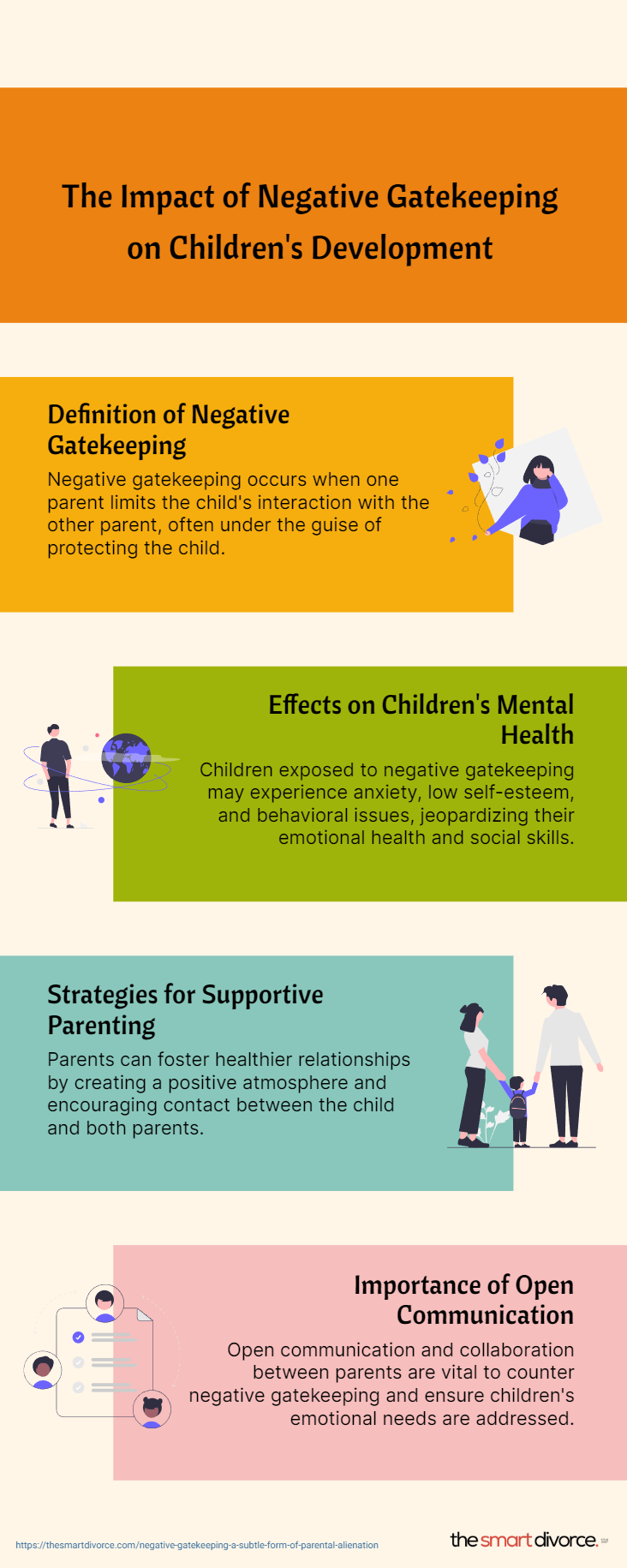Negative Gatekeeping Children
Parental alienation, in its various forms, is a challenging experience for any parent. Some manifestations are overt and easily identifiable, while others present a subtle but significant barrier. Negative gatekeeping falls into the latter category. In this blog post, we aim to empower you with a deeper understanding of Negative Gatekeeping, how it operates, and its impact on the parent-child relationship.
What is Negative Gatekeeping?
Negative gatekeeping refers to a subtle yet powerful form of parental alienation in which one parent, consciously or unconsciously, controls the narrative and undermines the other parent’s relationship with the child. Unlike direct forms of alienation, such as openly badmouthing the other parent, negative gatekeeping involves more covert behaviours that create doubt, fear, or concern in the child’s mind about the other parent.
Example of Negative Gatekeeping
Consider the following interaction:
- Parent A: “Did you have fun with Dad? That’s great! Where did you go? Oh, the park sounds like a lot of fun. Did you have dinner? Pizza? I know you love pizza! That’s wonderful.”
- Parent B: “I’m so glad you’re home. I missed you so much. Did you have a good time with Dad? You went to the park? Wasn’t it too cold for that? And you only had pizza for dinner? Why didn’t Dad give you any vegetables? Don’t worry; I’ll make your favourite soup.”
At first glance, Parent B’s words might seem caring and concerned, but they reveal a constraint on the child’s perception of their time with the other parent. However, they subtly imply that time spent with the other parent (in this case, the father) was somehow lacking or unsafe. Over time, these types of interactions can lead to the child’s exclusion of their experiences with the other parent, fostering feelings of anxiety or distrust.
The Impact of Negative Gatekeeping on Children
Negative gatekeeping can be a profound Obstacle affecting children. This subtle form of alienation, characterized by obstructive behaviour, can slowly erode the child’s positive feelings toward the alienated parent without the child even realizing it. The child might feel influenced to associate worry or discomfort with time spent with the alienated parent, leading to a strained or distant relationship.
Emotional Consequences
- Confusion: The child may feel confused about their feelings towards the alienated parent as they receive mixed messages.
- Anxiety: The subtle suggestions of danger or inadequacy can create anxiety in the child about spending time with the alienated parent.
- Guilt: The child may feel guilty for enjoying time with the alienated parent if the other parent’s responses suggest this is wrong.
Recognizing the signs of Negative Gatekeeping is essential for maintaining healthy family dynamics.
As a parent, it’s crucial to be aware of the signs of negative gatekeeping, whether you’re worried that you may be engaging in these limiting practices or concerned that it’s happening to you. Here are some key indicators:
- Subtle questioning about the child’s time with the other parent serves as an impediment by implying concern or disapproval.
- Overly protective behaviour suggests the other parent might not provide adequate care.
- Negative comments masked as concern, such as questioning the other parent’s choices in food, activities, or safety, can act as barriers in the parent-child relationship.
Why It’s Important to Address Negative Gatekeeping
Addressing the dividing lines created by negative gatekeeping is not just important; it’s essential for your child’s well-being and the strength of your parent-child relationship. If this hindrance is left unaddressed, it can lead to long-term emotional harm and a breakdown in the relationship between your child and the alienated parent. Your commitment to addressing this issue is key.
Final Thoughts
Negative gatekeeping is a subtle but damaging form of parental alienation. It can be not easy to recognize because it often comes across as concern or care. By being mindful of barrier formation and its potential impact, parents can protect their relationships with their children and ensure that their children maintain healthy relationships with both parents.
At The Smart Divorce
At The Smart Divorce, we understand the complexities of parental alienation and the exclusion it can cause. If you’re experiencing restrictive practices such as negative gatekeeping or any form of parental alienation, we’re here to help. We invite you to schedule a Complementary Get-Acquainted Call to discuss your concerns and explore how we can assist in addressing control issues and support you. Let’s collaborate to manage your child’s well-being and address constraining actions, maintaining a positive relationship with both parents. Schedule your call here.



